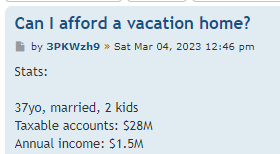Yeah, not repaying the previous distribution is the big problem.
Since it was your name on the form and the amount matches what you previously withdrew from your account, I don’t see why Vanguard can’t adjust the account balances and send corrected paperwork to the IRS.
Yeah, the language about “gold diggers” and all the complaints about crooked lawyers are not good signs.
“I have $5.2 million liquid, can I afford a $3 million house? (Lol $19k a year HOA!)
https://www.bogleheads.org/forum/viewtopic.php?f=2&t=398897&newpost=7144800
TIL even though the health insurance plan year is June 1 to June 1, deductibles are calculated on a calendar year basis. Seems unnecessarily confusing! But perhaps that’s a feature, not a bug.

Tough break, every vacation home in the world costs $30M.
People are taking it seriously!
The USA desperately needs apartment buildings that have businesses on the bottom level. Maybe, if they stopped solely building shitty apartments w/o integrated businesses that just add to automobile traffic, NIMBYS might not be so persistent.
This is the lamest excuse for NIMBYism yet. Street-level retail is not going to magically make it possible to live in a car-dependent US city without a car. If anything, it will increase the demand for parking, because you’ll need spaces for all the residents plus spaces for all the outside visitors to the retail establishment.
I lived in an area like this and that’s exactly what happened.
I think that few people think there is any “magic” solution to the car dependent structure of North American cities that is decades in the making. This sounds like the very common conservative misleading argument where you demand that any action be a perfect “magic” solution, and if it doesn’t fix everything right away then it must be rejected. I am very skeptical of these kinds of arguments because almost all meaningful progress is incremental. The line of argument is mostly to stop change because of naked self interest, which is very consistent with NIMBYism.
the article wasn’t about that, it was my take, but that will result in more walking/bikes since driving is limited but most importantly people realize how much happier they are once they abandon their dumb cars.
I think to achieve this kind of transformation in preferences requires a real dedicated commitment on many fronts to stop prioritizing the speed and convenience of car traffic over everything else. If you build mixed use dense neighborhoods but also provide tons of parking, 4 lane through streets with no bike lanes, and terrible transit then the value of the neighborhood doesn’t really come to fruition.
I’m not aware of any North American city that has actually made the effort to support high density mixed use on all fronts.
Not sure how having a nail salon in the ground floor of your apartment is supposed to make you happy to walk or bike long distances on unsafe, car-first streets to get to the places you need to go every day. The only US city where you might reasonably prefer not having a car is NYC.
This isn’t true at all. D.C. is a good example of a city where living without a car is more desirable than with, unless you just really want to own a car.
Even to the extent it is true, it is circular logic (the current preference for cars cannot be untangled from the current car-centric urban planning).
This issue is very complex, but it conforms to the pattern of lots of political arguments that we should be able to recognize:
- Evidence supported arguments suggest a change that would improve something.
- Parties that perceive a loss resulting from the change will combat it - they will try to undermine the evidence, and raise fear based campaigns warning people that they will have something taken away from them if the change goes through.
- Governments default to maintaining the status quo to avoid conflict, often combined with some tepid half measure they can claim as a progressive win but is more or less doomed to fail.
- The naysayers bleat I TOLD YOU SO after the half measure doesn’t solve the problem completely and cure cancer and eradicate world hunger.
I’ve lived in DC with no car, and it sucked.
This whole issue is much, much better understood by reading up on the collective experience of communities measured by people that are trying to design cities. Relying on individual experience will lead a lot of people to have skewed perspectives and introduce a lot of personal bias.
Another issue is that this is much harder to design for than evolve naturally.
A vibrant, walkable neighborhood has a range of different properties close by. Different sizes, different rents and qualities, etc.
My walkable neighborhood in melbourne has a bunch of shitty old shops next to a big condo building. The condo building has an expensive bike shope on the ground floor. The shitty shops have a dry cleaners, a hairdresser, a cafe and a shisha bar.
Further up the street theres a couple of high end restos as part of a new development, and a bunch of cheap indian and thai places.
Where theyve tried to design for this. All the retail spaces are the same size/quality/price. So you have these soulless neighborhoods full of condo buildings with expensive chain restaurants on the ground floor. It sucks.